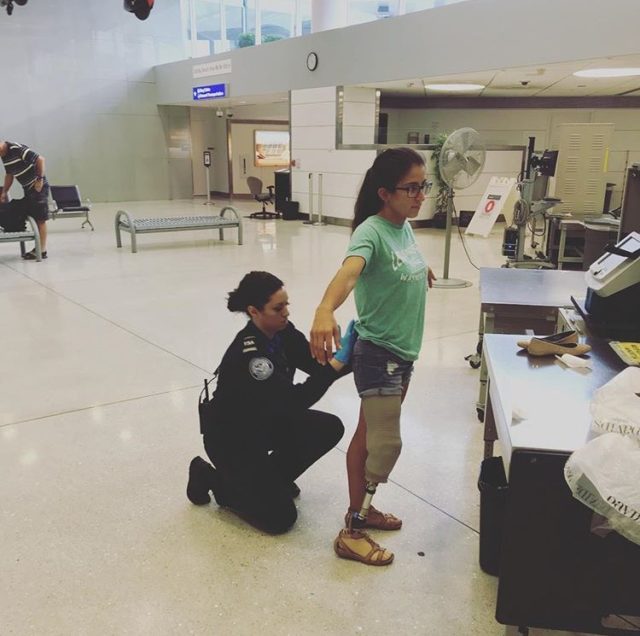Traveling with a prosthesis? Tips and Tricks to make sure your trip goes smooth sailing or flying!
Not knowing what to expect when traveling with a prosthetic device can be a frightening. Do not fear, here are some things to keep in mind when traveling.

Going on a trip can be exciting, especially when you are going to a new destination or visiting friends and family. However, it is also notorious for being a tedious affair, especially for those that wear a prosthesis. But the thought of preparing everything you need to ensure a hassle-free trip does not have to put a damper on your travel spirits. So, we’ve put together this handy travel guide for you to ensure smooth sailing.
Prior to scheduling your itinerary
Keep in mind your travel connections:
Some airports are larger than others, trams might need to be taken, stairs, and a lot of walking. Ensuring a proper layover and keeping in mind the airport you will be making a connection in will allow you to have a stress-free journey to your destination.
For example, bilateral above-knee amputees, expend a lot of energy just walking, and airports can be very exhausting. They are even exhausting for able-bodied individuals. So, as you travel, you might want to keep a running list of the best and the worst airports in which to connect, and if you, unfortunately, have to stop at one of the bad ones, ensure you have enough of a layover to get where you need to go without having to rush.
Contact TSA Cares

Hopefully, you’re reading this at least a few days before your flight because it is recommended to get in touch with TSA Cares at least 72 hours in prior to departure. TSA Cares is the TSA’s dedicated helpline that assists travelers with medical conditions. If you are traveling with a prosthetic arm or leg, they will provide you with guidance on what you can expect during the TSA’s screening process. They will also be able to assist you with any questions or concerns you might have with a representative
If the representative deems it necessary, they will refer you to a passenger support specialist, who is trained to help individuals with specific needs. They can also assist you throughout the safety screening process to ensure that someone can take care of your needs.
If you want to request for a passenger support specialist, call TSA Cares at 855-2227 and 787-2227. They are open on Mondays through Fridays, from 8:00 AM until 11:00 PM Eastern Standard Time (EST). Meanwhile, on weekends and holidays, you can speak to a representative or a specialist from 9:00 AM until 8:00 PM.
Be sure to notify the TSA officer that you have a prosthetic device before screening begins. You have the option to remove your prosthetic and have the device x-ray screened. If you’d prefer to not mention your prosthetic verbally, the TSA provides a notification card which you can print out on the TSA’s website and hand it to the agent. Should you wish for a private screening, remember that you can request for it.
You can find that notification card here:
https://www.tsa.gov/sites/default/files/disability_notification_card_508.pdf
If you opt for a private screening, remember that you can ask to be accompanied by an assistant, friend, or family member who can assist you, but only after they have been successfully screened themselves. If you are not comfortable with a private screening, you have the right to refuse it, but you will still need to complete a security screening to proceed beyond the security checkpoint.
Regardless of the chosen screening method, your prosthesis will always need to undergo additional screening. The TSA officer may ask to see and touch your prosthesis but will not request or require you to remove it.
Pro tip:
Expect that you might set off security monitors, and wear comfortable, loose clothing and slip-on shoes so it’s easy to show your devices when requested. Also, get to the airport with plenty of time to spare, it’s better to get to your gate with extra time than to miss your flight due to security delays.

Prior to date of departure
First and foremost, it is important to check your prosthesis thoroughly to make sure it is in good shape. If you will be out of town for a couple of days or a few weeks it is imperative to make sure there are no cracks, leaks, etc. This is so that you have enough time to schedule an appointment with your prosthetist to make adjustments and repairs before you leave on business, vacation, or any scheduled trip.
Miscellaneous, yet important, things to keep in mind when travelling
Be mindful of hygiene. Travel exposes you to more people and places than your everyday life. Make sure you bring whatever you need in order to keep your prosthesis and your skin clean and disinfected.
If you think you might need it (ask your prosthetist), bring spare parts with you, especially because medical devices travel for free. If an airline ever wants to charge extra for a bag that contains prosthetic parts or supplies, just let them know that the bag contains medical devices; the bag should go free of charge. Do note that this only applies to bags that contain only medical devices, but some airlines are stricter than others on this rule.
Extra Things You Might Want to Pack:
– Extra prosthetic socks
– Extra socket liner
– Duct and filament tape to repair strap or buckle breaks
– Antibacterial cream for abrasions from overuse
– Spare suction valve
– Plastic bags to protect your prosthesis if you wear it around water or sand
– Phone numbers of certified prosthetists and prosthetic facilities in the area in which you are vacationing (just in case).
Here is a link to a handy prosthetic bag:
https://amputeestore.com/products/amputee-essentials-prosthetic-leg-bag
While traveling with a prosthesis may seem like a recipe for airport security disaster, it is not always the case. If you have done your research and you took the necessary steps to prepare for it, the odds are most likely in your favor.
If you have any tricks you would like for us to add to this post, please let us know in the comments! Any other questions? Please contact our office 949-699-0600.
